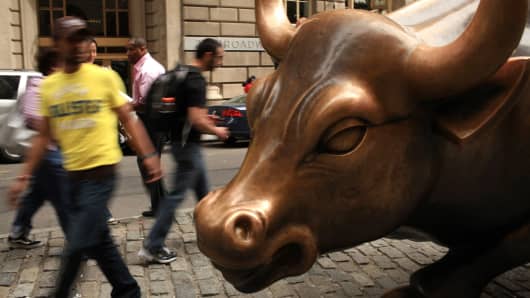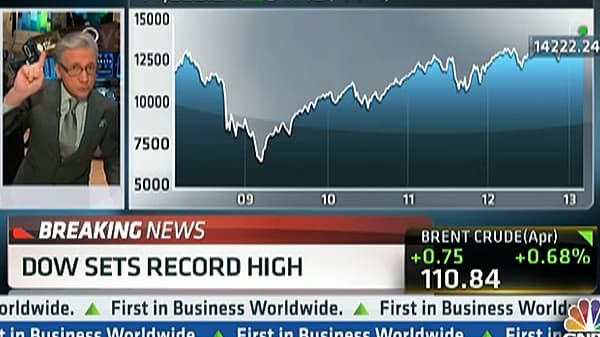"With the Dow getting to all-time highs, is this signaling the end of the lost decade?" said Jim Paulsen, chief market strategist at Wells Capital Management in Minneapolis. "Maybe not. It didn't last time. But you wonder in some sense if that is the significance to this."
(Read More: Earnings Aside, Fed Is Still Main Market Player)
While the move only kindled the spirits of the many market bulls, some were pondering whether this was as good an excuse as any for investors to take profits.
"It certainly isn't that we're bearish. It's that we're skeptical anytime the button on the elevator remains stuck on 'up,'" said John Stoltzfus, chief market strategist at Oppenheimer. "We just question what is driving it. Is it fundamentals or enthusiasm?"
The Dow Jones industrial average, which consists of 30 top industrial stocks, was the first of the major indexes to reclaim its summit following the market reached its crisis low four years ago this month.
It did so on the backs of $3 trillion of liquidity from the Federal Reserve's money printing, and an improving corporate and economic picture.
(Read More: CNBC Explains Quantitative Easing)
While the economy is far from fixed and the market remains highly sensitive to the daily headline churn, the importance of breaking the financial crisis shackles did not go unnoticed.
That's especially true since the looming danger of steep budget cuts in Washington - known as sequestration - remains but has been largely ignored on Wall Street.
The new record "certainly is a statement by the market that it is looking to the improvements in the economy," Stoltzfus said. "In light of that, sequestration is not the issue many of us thought it would be."
(Read More: What Investors Are Missing in the Sequester Fight)
That's not to say expectations are that the market will keep climbing higher without interruption.
Strategists have been waiting for the aggressive 2013 rally to take a healthy break, and the talk on trading floors was that a new record could spur just such a pullback, however brief.
History, in fact, has been unkind to markets that rally back to even after dramatic falls the likes of what the U.S. indexes experienced during the crisis.
For the Dow it only took 15 months for the average to go from new high to a 6,547-point drop.
The Standard & Poor's 500 is within range of its all-time closing high of 1,565.15, from which it subsequently lost nearly 900 points.
"The S&P 500 may have little time to rejoice following the setting of a new record high before collapsing once again," said Sam Stovall, chief equity strategist at S&P Capital IQ.
In previous rallies from bear markets to breakeven the median additional gain has been just 3 percent before "another meaningful decline within only two months," Stovall added.
In the 11 other bear markets since 1946, five of them suffered declines of 5 to 10 percent after getting back to even, while six fell 10 to 20 percent. The only good news, according to Stovall, is that none of those morphed into full bear market drops of 20 percent or more.
"So this time around it may be wise to fasten your safety belt once we set a new high," he said. "We may be in for a bumpy ride."
-By Jeff Cox, CNBC.com senior writer. Follow him on Twitter at @JeffCoxCNBCcom.





